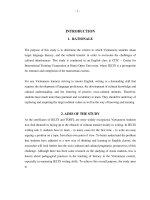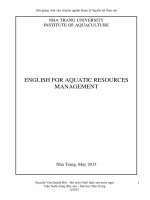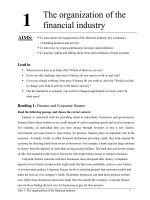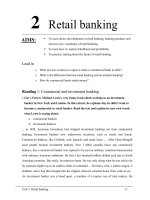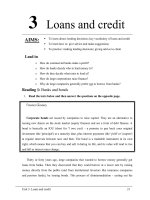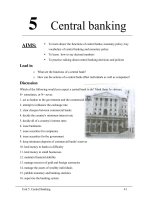Bài Giảng Anh Văn Chuyên Ngành 1 - Ba18 - Đại Học Mở Hà Nội.pdf
Bạn đang xem bản rút gọn của tài liệu. Xem và tải ngay bản đầy đủ của tài liệu tại đây (5.42 MB, 131 trang )
<span class="text_page_counter">Trang 1</span><div class="page_container" data-page="1">
<b>UNIT 1- BRANDS </b>
<b>READING What’s in a brand? </b>
<b>A. Before you read, try to answer the following question: </b>
One of the world’s longest lasting brands is Levi’s. What do you know about it? What is its product? Can you think of any other long – lasting brand names? What are they?
<b>B. Now read the article and do the exercises that follow: WHAT’S IN A BRAND? </b>
A People often wonder what makes a brand different from a product. Quite simply, in marketing terms, products aren’t brands. Products are general, while brand are something quite unique. Brand identity consists of far more than the physical product itself. It includes all the psychological features that we have learnt to associate with it. Topbrands form a personal relationship with consumers; they’re able to make us feel more confident, more powerful, healthier, and happier. Brands are promises and people buy what they believe in.
</div><span class="text_page_counter">Trang 2</span><div class="page_container" data-page="2">B A brand has USPs (Unique Selling Propositions), specific features which set it apart from its competitors. For example, Barbie was the first doll to look like a young woman, and a metal rivet was the unique feature of Levi jeans. Both brands have had numerous imitators, but generally speaking, a ‘me-too’ product won’t achieve the success of the one it follows.
C People who say you don’t need to worry about your competitors couldn’t be more wrong. Competent managers have to know how to position their brand in relation to the competition, in terms of factors like price and quality of the product. Managers should relate the brand’s values in a meaningful way to the consumers they have targeted. With worldwide brands this may mean changing your message from country to country.
D The product life cycle is a familiar one in marketing. A product is launched, developed, goes through a period of growth, enters maturity, declines, and eventually dies. A top brand should go on and on if it is well managed. A brand manager is like a doctor or plastic surgeon, who can keep the brand healthy and looking fresh down the years. Knowing what stage your branded product is at in this cycle may help you decide when to launch a line extension – such as a different size or colour – or if you ought to relaunch it with ‘added-value’ features. Newer version of cars, for instance, will come with air-conditioning as a standard feature, or they will have to face-lift to modernize the look even though what’s under the bonnet may stay the same.
1 Which paragraph (A-D) does these headings belongs to?
</div><span class="text_page_counter">Trang 3</span><div class="page_container" data-page="3">c. Marketing medicine …. d. The feel-good factor ….
2 Read the text again and decide if these statements are (T) or false (F):
a. <i>Brand is just another word for product</i>. ….
f. If your audience changes, it might be necessary to change what you say about your product. ….
cosmetic. ….
cycle:
<b>LISTENING Why brands matter? </b>
<b>A. 1.1 Sandra Greaves is a consultant at Wolff-Olins, a leading international brand consultancy based in London. In the first part of the interview she talks about why we need brands. Listen and complete these extracts with the following words: </b>
</div><span class="text_page_counter">Trang 4</span><div class="page_container" data-page="4">deliver colour choose means
trust time and time enjoyment
1 Brands are all about………. .
2 You know what a brand is about, what it ………., what it’s going to ……… 3 You actually trust it to deliver ……. ……. ……… again.
4 One thing about brands is they add a lot of ……… and ……. and fun as well as giving you the power to ………. things.
<b>B. 1.2 Listen to the second part of the interview and tick the points below which Sandra makes. </b>
1 People are very loyal to successful brands.
2 Even successful brands are seen as just a product or a service.
3 Apple was popular because it wasn’t a big corporation.
4 Apple customers felt that the Mac was an easy product to use.
<b>C. 1.3 Listen to the example Sandra gives of how Wolff-Olins helped a company with its branding and choose the correct answer: </b>
1 What was the company?
2 What is its business sector?
A Computer B Mobile phones C air conditioner
3 What advice did they receive?
A not to call the B Call the service C Call the service
</div><span class="text_page_counter">Trang 5</span><div class="page_container" data-page="5">service Microtel Microtel Mytel.
<b>SPEAKING Liking or disliking brands </b>
<b>A. <small>1.4 </small>Listen to two speakers answering the question ‘Do you buy brands?’ Complete the extracts.</b>
<b>Speaker 1: </b><i>‘I am basically pro brands. If you buy a branded product it’s a guarantee that the ………… 1 is fairly good and the product is………… 2. Another reason is you attract a bit of attention if you buy something ………… 3, and branded products are usually stylish and have a good design. …’ </i>
<b>Speaker 2: </b><i>‘I don’t want to give free advertising to companies. I hate all the ………… 4 hype around brands. And I don’t want other people to think I’m trying to impress them with lots of ………… 5. And I also get fed up seeing the ………… 6 things wherever you go. If you buy a suit from a famous brand you’ll see five people with the same suit that month. It’s so boring. Another thing – am I buying the genuine product or an illegal copy? Basically I want ………… 7. I won’t pay inflated prices for a name, a fancy ………… 8 and packaging. However, I do buy always Nike, Adidas or Reebok.’ </i>
<b>B. </b>
<b>Practice answering the question yourself.</b><b>LANGUAGE WORK </b>
A. <b>Match these word partnerships to their meanings. </b>
</div><span class="text_page_counter">Trang 6</span><div class="page_container" data-page="6">2 image b) using an existing name on another type of product
3 stretching c) the ideas and beliefs people have about a brand
4 awareness d) the tendency to always buy a particular brand
5 name e) how familiar people are with a brand
6 launch f) the set of products made by a company
7 lifecycle g) the use of a well-known person to advertise products
8 range h) when products are used in films or TV products
9 placement i) the introduction of a product to the market
10
endorsement
j) the length of time people continue to buy a product
<b>B. Complete these sentences with word partnerships from Exercise 1. </b>
1 The creation of Virgin Cola, Virgin Rail and Virgin Bride is an
<i>example of brand stretching. </i>
2 Consumers who always buy Levi’s when they need a new pair of jeans are showing ……….
3 Not enough people recognize our logo; we need to spend a lot more on raising ……….
</div><span class="text_page_counter">Trang 7</span><div class="page_container" data-page="7"><i>The modal verbs include can, must, may, might, will, would, should, and need </i>
sometimes. They are used with other verbs to express ability, obligation, possibility, and so on. Below is a list showing the most useful modals and their most common meanings:
can to express ability <i>I can speak a little Russian. </i>
can to request permission <i>Can I open the window? </i>
may to express possibility <i>I may be home late. </i>
may to request permission <i>May I sit down, please? </i>
must to express obligation <i>I must go now. </i>
must to express strong belief <i>She must be over 90 years old. </i>
should to give advice <i>You should stop smoking. </i>
would to request or offer <i>Would you like a cup of tea? </i>
would in if-sentences <i>If I were you, I would say sorry. </i>
Modal verbs are unlike other verbs.
They are auxiliary verb so they do not need an additional auxiliary in negatives or
<i>questions. For example: Must I come? (Not Do I must come?), or: He shouldn't smoke (not He doesn't should smoke). </i>
</div><span class="text_page_counter">Trang 8</span><div class="page_container" data-page="8">They do not change their form (spelling) and they have no infinitive or participle
<i>(past/present). The modals must and can need substitute verbs to express </i>
obligation or ability in the different tenses. Here are some examples:
Past simple Sorry I'm late. I had to finish my math test. Present perfect She's had to return to Korea at short notice.
Future You'll have to work hard if you want to pass the exams. Infinitive I don't want to have to go.
Past simple I couldn't/wasn't able to walk until I was 3 years old. Present perfect I haven't been able to solve this problem. Can you help? Future I'm not sure if I will be able to come to your party.
Infinitive I would love to be able to play the piano.
<b>B. Look at a-f below. Which of the words in italics: </b>
1 tells us that something is essential? …. 2 suggests that something is a good idea? …. 3 says that something isn’t necessary? …. 4 describes a responsibility? ….
5 says that something is a possibility? …. 6 describes an ability? ….
<i>a Mangers should relate the brand’s values in a meaningful way. b A brand manager can keep the brand healthy. </i>
<i>c Managers have to know how to position their brand in relation to </i>
the competition.
<i>d This may mean changing your message. </i>
</div><span class="text_page_counter">Trang 9</span><div class="page_container" data-page="9"><i>e Brands must have USPs. </i>
f You <i>don’t need to worry about your competitors. </i>
<b>C. Which of the words in italics in A above could these expressions replace? </b>
1 is able to …….. 2 don’t have to …… 3 might / could …… 4 ought to …….
<b>D. Rephrase the parts of 1-6 in italics using one of the models above, as in the example. </b>
1 <i>It’s a top priority that we come up with a fresh slogan. We must come up with a fresh slogan </i>
<i>2 Will the new agency know how to rescue the brand’s image? </i>
<i>3 Her job involves analyzing sales figures and motivating the sales team. </i>
4 <i>It’s a good idea for us to target younger people too. </i>
5 Our logo is fine the way it is. <i>It’s unnecessary for us to change it. </i>
6 <i>It’s near the end of its life cycle; there’s a chance that we have to stop </i>
</div><span class="text_page_counter">Trang 10</span><div class="page_container" data-page="10">Message:
<b>a ……….. </b>
I am in town until Thursday. I rang and left a message but wasn’t sure you would get it. I am staying at Bell’s hotel – room 19. Tel 7948862. Though I’d better give you my mobile too – it’s 0707689422. I’ve got meeting all today and tomorrow, but why don’t we have dinner on Tuesday or Wednesday night? Contact me a.s.a.p. you can e mail me (I’ve got my notebook)
<b>b……….. Siobhan. </b>
<b>Date: 16 August </b>
<b>FAO: Ms. M Collins, Human resources. No of pages: 3 including this one. Re: Work experience placement. c ……….. Collins </b>
Thank you very much for sending me your application form and information pack so quickly. I am faxing the completed form as I know the final date for applications is approaching. I am going to post the form this afternoon, so you should receive it later in the week. I look forward to hearing from you.
</div><span class="text_page_counter">Trang 11</span><div class="page_container" data-page="11">I am writing in response to your advertisement in ‘Plunge’ magazine. Please could you send me details of your introductory diving courses? I am a twenty – six year old physical education teacher and a keen swimmer and tennis player. I would also be interested to know what rate you could offer for a group of four or five similar people.
Please could you include details of accommodation and equipment hire.
<b>f……….. </b>
M. Pearson
Mildred Pearson (Ms) 1 Which is
a. A covering letter for a fax? …. b. A letter of enquiry?
c. An e mail?
2 What is the reason for writing in each case?
a. To explain why the writer has decided to fax the application form.
b. To request further information about diving courses advertised in a newspaper.
c. To make a contact and arrange a meeting with a friend.
3 Complete gaps a – f in A, B, C with an appropriate expression from the box below.
Dear Sir or Madam Hi
Dear Ms
Yours sincerely Yours faithfully
Hope to see you soon!
<b>B. Further Practice: (bài tập tự luận) Choose one of the tasks: </b>
</div><span class="text_page_counter">Trang 12</span><div class="page_container" data-page="12"><b>Task 1: You are Corinne. Write a short e mail to Siobhan suggesting a time and </b>
place where you can meet.
<b>Task 2: Write a fax to Ms Collins from Jean Jack Giradoux. Say that you are </b>
delighted that you have been accepted for a placement. Ask if the company can help you organize accommodation for your stay.
<b>Task 3: Write a short letter to the enrolments secretary at the Crowfield Business </b>
School asking for a prospectus of their business studies courses. Ask if grants are available for foreign students.
</div><span class="text_page_counter">Trang 13</span><div class="page_container" data-page="13">1- trust
2- means, deliver
3- time and time
4-color, enjoyment, choose
1. Quality 2. Reliable
</div><span class="text_page_counter">Trang 14</span><div class="page_container" data-page="14">3. Stylish 4. Advertising 5. Logos 6. Same
7. value for money 8. logo
<b>VOCABULARY </b>
<b>A. </b>1_ d; 2_C; 3_b; 4_e; 5_a; 6_i; 7_j; 8_f; 9_h; 10_g
<b>B. </b>
2. brand loyalty 3. Brand awareness
5. Product lifecycle 6. Product placement
<b>GRAMMAR </b>
<b>B. </b><i>4. We should target young people, too. </i>
5. Our logo is fine the way it is. We <i>don’t need to change it. </i>
</div><span class="text_page_counter">Trang 15</span><div class="page_container" data-page="15"><i>6. it’s near the end of its life cycle. We might have to stop production. </i>
<b>WRITING A. </b>
1. a B – b C – c A 2. a B – b C – c A 3.
a. Hi
b. Hope to see you soon c. Dear Ms
d. Your sincerely e. Dear sir or Madam f. Your faithfully
<b>B. Suggested answers: (gợi ý làm bài tập tự luận) Task 1: </b>
Hi,
Great to hear you’re in town! I got a message that you rang, but my colleague wrote down the wrong phone number and room number. He didn’t even get the name of the hotel right!
I am afraid I’m busy on Tuesday night, but it would be lovely to have dinner on Wednesday. Hope that’s still OK with you.
I’ll call you on mobile tomorrow to arrange where to meet. Can’t wait to see you again.
Bye for now!
<b>Task 2: </b>
FAO: Ms. M Collins, Human Resources
</div><span class="text_page_counter">Trang 16</span><div class="page_container" data-page="16">Re: Work experiment placement. Dear Ms. Collins
I am writing to thank you for your letter informing me that I have been accepted for a work placement at paradise marketing. I am delighted by this news and look forward to starting next month.
I wonder if the company would be able to help me to organize accommodation. I would be grateful if you could let me know.
Yours sincerely.
<b>Task 3: </b>
Dear Sir/ Madam
I am writing in response to an advertisement I saw for your school in a Polish magazine. Pleas could you send me a copy of the prospectus for your business study courses?
I am hoping to come to the UK to study for a year, so I would be interested to know if there are any grants for oversea students.
I look forward to hearing from you. Yours faithfully.
</div><span class="text_page_counter">Trang 17</span><div class="page_container" data-page="17">AUDIO SCRIPTS
<b>UNIT 1 BRANDS </b>
<b> 1.1 (I = interviewer, SG = Sandra Greaves) </b>
I <b>What are brands and why do we need them? </b>
<b>SG Well, brands are all about trust. You know what a brand is about, what it </b>
means, what it’s going to deliver and you actually trust it to deliver time and time again. So in a world of endless choice, a brand can give you something to fix on – it’s a kind of beacon in the darkness. So you know that Coca-Cola will taste exactly the same wherever you are in the world.
You can argue that we don’t need brands, that we’d all be better off in a world where nothing is branded and we all wear blue overalls and buy oats out of sacks and have no choice over who bank with or what TV channels we watch. And I think one thing about brands is they add a lot of colour and enjoyment and fun, as well as giving you the power to choose things.
<b> 1.2 (I = interviewer, SG = Sandra Greaves) </b>
<b>I </b> And what’s the secret of a really successful brand?
<b>SG Really successful brands are ones that tap into an emotion and that way </b>
they can inspire fierce loyalty. So they’re much more than just a product or a service – they’re an attitude, and that’s carried through in everything about the brand – from the communications to the culture of the organization, to everything you see about the brand. So, Apple is a good example. It stands for a kind of anti – authoritarianism. It’s against big corporations, though it is a big corporation itself, and Apple started out when computers were big and scary and quite off – putting. Apple invented the Mac and you turned it on
</div><span class="text_page_counter">Trang 18</span><div class="page_container" data-page="18">and you got a smiley face, it was really easy to use and that’s something that Apple has carried through right through till today, where people are in love with the I-Pod and the I-Mac and the I-Book.
<b> 1.3 (I = interviewer, SG = Sandra Greaves) </b>
I Can you give an example of how you’ve helped a company with its branding?
SG Yes, our er … the classic example we have is Orange, the mobile phone service, and orange really changed the way people felt about mobile phones. When everyone else was talking about technology, Orange talks about lifestyle and communication. It was originally going to be called Microtel and we worked with parent company to get them away from all of that and create something entirely different. Something that was about optimism. ‘The future’s bright, the future’s Orange’ is the line that everyone remembers and it created a new world of communication – people became quite passionate about using Orange and it was highly successfully financially.
<b> 1.4 (I = Interviewer, R1 = Respondent 1, R2 = Respondent 2) </b>
I Do you buy brands?
R1
Yes I do. I am basically pro brands. If you buy a branded product it’s a guarantee that the quality is fairly good and the product is reliable. Another reason is you attract a bit of attention if you buy something stylish, and branded products are usually stylish and have a good design. Let’s face it, most people buy brands because they want to impress other people. They want to show that they have style and good taste.
I Do you buy brands?
</div><span class="text_page_counter">Trang 19</span><div class="page_container" data-page="19">R2 No. I don’t want to give free advertising to companies. I hate all the advertising hype around brands. And I don’t want other people to think I’m trying to impress them with lots of logos. And I also get fed up seeing the same things wherever you go. If you buy a suit from a famous brand you’ll see five people with the same suit that month. It’s so boring. Another thing – am I buying the genuine product or an illegal copy? Basically I want value for money. I won’t pay inflated prices for a name, a fancy logo and packaging. However, I do buy always Nike, Adidas or Reebok.
<b>SUMARY </b>
In this lesson, you learn 5 main parts:
</div><span class="text_page_counter">Trang 20</span><div class="page_container" data-page="20"><b>UNIT 2 - TRAVEL </b>
<b>Travel risk management and duty of care </b>
<b>A. Answer the questions before you read the article. </b>
How often do you travel on business? Have you ever suffered from any risk? If yes, who do you think must be responsible, you or your company?
<b>B. Now read the article. Which of these statements are true or false? </b>
1. Companies must be responsible for their employees’ safety when they are traveling abroad.
2. Health is one of the matters to be paid attention to before the trip.
3. Information about natural disasters should be given to the travelers by the weather forecast.
4. The article implies that navigation engines are necessary for the company to control the traveling employees.
5. This article is already a full version.
</div><span class="text_page_counter">Trang 21</span><div class="page_container" data-page="21"><b>C. Read the article again and combine words and column A to its partnership in column B </b>
<b>D. Match the phrases from C to their meanings: </b>
1.
The state or fact of having a duty to deal with something or of having<b>control over someone </b>
2.
designed or serving to prevent the occurrence of disease3.
An act or course of action to which a person is legally bound; a duty or<b>TRAVEL RISK MANAGEMENT AND DUTY OF CARE </b>
Travel risk management is a hot topic in corporate travel management – and for good reason. Beyond a moral responsibility to keep employees out of harm’s way, organizations have a legal obligation to do so. Laws hold a company responsible for the safety and security of its employees while they are working. This is known as ‘duty of care’ and it specifically applies when employees are traveling for business purposes. It should be noted that duty of care applies not only to foreign travel, but also local and domestic travel.
An organization’s duty of care liability can extend to situations such as:
</div><span class="text_page_counter">Trang 22</span><div class="page_container" data-page="22"><small></small> Educating employees on recommended inoculations before traveling to certain areas
<small></small> Ensuring access to adequate medical treatment while working overseas <small></small> Having a business continuity plan in the case of a natural disaster
<small></small> <sub>Providing pre-trip briefings of political unrest and other risks in areas where </sub>employees are sent
<small></small> Providing evacuation in the event of an accident or uprising
<b>Travel Risk Management strategies emphasize prevention before travel begins. </b>
Travel policies can help prevent risk by requiring employees to use preferred car rental vendors that offer well-maintained vehicles or by setting hotel requirements and standards. They might include restrictions of how many employees can travel on the same flight and a pre-defined process for communication when in high-risk destinations. Prevention also includes the duty of informing travelers of inoculations and visas required for their destination or a simple reminder to only drink bottled water for health reasons.
Risk mitigation also includes making travelers aware of current events, potential political hotspots or the propensity for natural disaster that could put an employee
<b>at risk during their business travel. Pre-trip briefings, such as travel alerts or </b>
cultural training, highlight local customs and situations of which travelers should be aware. To successfully educate travelers before they go, an organization needs to know who is traveling, when and where they are going, prior to the trip. Travel Management Companies can provide traveler information reports from their own systems or from risk management providers such as iJet, Concur Risk
<i><b>Management or Safe to Go. We will discuss specific tracking options in Part 2 of </b></i>
this series next month.
Beyond destination intelligence and preventative care, organizations should also
<b>be prepared to provide guidance and assistance to keep employees safe </b>
</div><span class="text_page_counter">Trang 23</span><div class="page_container" data-page="23"><i>during the course of business travel. Again, it is important that an organization </i>
knows the location of their employee (city and hotel), and know how to communicate with them. Detailed data is an invaluable tool to track, locate and communicate with the employee while they are away from home.
<b>An effective duty of care plan may include facilitating a passport replacement or </b>
making funds available after a theft, providing instructions to stay or leave during unrest, or arranging evacuation home after a serious illness or injury.
The stakes are high for the organization, both morally and fiscally. The UK’s Corporate Manslaughter Act of 2007 applies to any work-related death in the UK, whether or not the employer is registered in the UK. It has become the standard for corporate travel safety worldwide, but the liability issue is complex, so legal counsel may be appropriate. Interestingly, some companies foster a ‘duty of loyalty’ culture in their travel programs. They reward business travelers for following travel policy and avoiding risky conduct at their destinations.
<b>LISTENING </b>
<b>A business traveler’s priorities </b>
<b>A. 2.1 Stephanie Taylor is a businesswoman who travels regularly as part of her job. Listen to the first part of the interview and choose the three priorities she mentions from the list below. </b>
Good organization Easy booking Regular transport
Balancing cost with comfort Being patient Airline food
<b>B. 2.2 Listen to the second part of the interview and tick the best or the worst travel experiences that Stephanie describes. </b>
Best Worst
</div><span class="text_page_counter">Trang 24</span><div class="page_container" data-page="24">1. Great hotel with good facilities (beautiful towels, bathroom, soft bed, sport facilities …) 2. The Virgin lounge with good
technology
3. Things out of control’ such as bad accommodation and delayed or cancelled flights
<b>C. </b><small></small><b>2.3 Listen to what Stephanie ways about future business travel and complete her prediction below. </b>
standards businesswomen accommodation facilities specific
Perhaps, particularly in the area of ………. I think hotels will need to improve their ………. in general. There are some very good hotels already, but I think more hotels will provide ………. for businesspeople …perhaps some ………. facilities for………. .
<b>SPEAKING </b>
<b>Air travel problems </b>
<b>A. 2.4 Listen to three people talking about their travel. Fill in the gaps with the problems below: </b>
1 not enough leg room
2 lost or delayed luggage
3 long queue at check-in
4 jet - lag
5 no baggage trolleys available
6 overbook seats
7 flight delays and cancellations
</div><span class="text_page_counter">Trang 25</span><div class="page_container" data-page="25">8 poor quality food and drink
<b>Traveler 1: </b>
What I really don’t like is the way airlines treat people on the plane. There are far too many seats on most planes, so there is not enough (1)………, and I am not ever particularly tall. Also the (2)………you get on airlines annoys me. It’s all so processed and packaged, I just can’t eat it. I prefer trains!
<b>Traveler 2: </b>
I like flying, but I early don’t enjoy being at airport. Things like (3)……… irritate me. Also when I have a lot of luggage and there are (4)……… available, it’s really inconvenient. What I find even more frustrating is when I finally do find a trolley and then find the departures board is full of (5)……… .
<b>Traveler 3 </b>
I must be very unlucky because it seems I am always a victim of (6)……… . It usually turns up but never with an apology. I don’t like the attitude of the airlines. They seem to treat passengers like just another piece of luggage to be moved around the world. They seem to forget that we are people. For example, they (7)……… and just expect people to be able to take the next flight if their flight is full. What I really hate though is (8)………. . It’s a big problem for me, as I travel a lot to the Far East on business.
<b>B. Now practice talking about problems you often face when traveling by bus, by bike or by train… </b>
<b>LANGUAGE WORK </b>
<b>VOCABULARY British and American English in travel </b>
</div><span class="text_page_counter">Trang 26</span><div class="page_container" data-page="26"><b>A. Match the words and phrases below which have the same meaning. For each pair decide which is British English and which is American English. </b>
2. city centre b) lift
3. carry-on baggage c) public toilet
4. one way d) schedule
7. rest room g) parking lot
8. elevator h) underground
9. coach class i) hand luggage
10. timetable j) round trip
<b>B. Use words or phrases in American English from Exercise A to complete the text below. </b>
My last overseas business trip was a nightmare from start to finish. First of all there was a delay on the way to the airport as there was an accident on the
<i>freeway (1). When I got there I found the lower level of the airport </i>
………. (2) was flooded. Next my ………. (3) was too big and heavy so I had to check it in. when we arrived the ………. (4) was closed and there were no cabs at all. After a long time trying to read the ………. (5) and waiting for forty minutes. We finally got a bus
</div><span class="text_page_counter">Trang 27</span><div class="page_container" data-page="27">………. (6) and found the hotel, but the ………. (7) wasn’t working and our rooms were on the fifth floor.
<b>GRAMMAR </b>
<b>Talking about thefuture </b>
<b>A. Theory </b><b>1. When we know about the future we normally use the present tense. </b>
<b> We use the present simple for something scheduled or arranged: </b>
<i><b>The train arrives at 6.30 in the morning. </b></i>
<b> We can use the present continuous for plans or arrangements: They are coming to see us tomorrow. </b>
<b>2. We use will to talk about the future: </b>
<b> When we make predictions: </b>
<i><b>I think Brazil will win the World Cup. To mean want to or be willing to: </b></i>
<i><b>I hope you will come to my party. </b></i>
To make offers and promises:
<i><b>I'll see you tomorrow. </b></i>
<b> To talk about offers and promises: </b>
<i><b>Mary will help with the cooking. 3. We use (be) going to: </b></i>
<b> To talk about plans and intentions: </b>
<i><b>I’m going to drive to work today. </b></i>
<i><b>They are going to move to Manchester. </b></i>
<b> When we can see that something is likely to happen: </b>
</div><span class="text_page_counter">Trang 28</span><div class="page_container" data-page="28"><i><b>Be careful! You are going to fall. </b></i>
<i>Look at those black clouds. I think <b>it’s going to rain. </b></i>
<i><b>4. We often use verbs like would like, plan, want, mean, hope, expect to talk </b></i>
<i>about the future: </i>
<i>What are you going to do next year? <b>I’d like to go to University. We plan to go to France for our holidays. </b></i>
<i><b>George wants to buy a new car. </b></i>
<i><b>5. We use modals may, might, and could when we are not sure about the </b></i>
future:
<i><b>I might stay at home tonight, or I might go to the cinema. We could see Mary at the meeting. She sometimes goes. </b></i>
<i><b>6. We can use should if we think something is likely to happen: </b></i>
<i><b>We should be home in time for tea. </b></i>
<i><b>The game should be </b>over by eight o’clock. </i>
<b>7. Clauses with time words: </b>
<i><b> In clauses with time words like when, after, and until we often use a </b></i>
<b>present tense form to talk about the future: </b>
<i><b>I’ll come home when I finish work. </b></i>
<i><b>You must wait here until your father comes. They are coming after they have had dinner. 8. Clauses with if: </b></i>
<i><b> In clauses with if we often use a present tense form to talk about the </b></i>
future:
<i><b>We won’t be able to go out if it rains. </b></i>
<i><b>If Barcelona win tomorrow they will be champions. </b></i>
</div><span class="text_page_counter">Trang 29</span><div class="page_container" data-page="29"><b>9. We can use the future continuous instead of the present continuous or going to for emphasis when we are talking about plans, arrangements and intentions: </b>
<i><b>They’ll be coming to see us next week. I will be driving to work tomorrow. </b></i>
<b>B. Practice </b>
<b>1. The managing director of Hong Kong - based hotel group is talking to his managers about the group’s future plans. Underline the plans that he mentions: </b>
‘Well, I think you all know by now that we’re hoping to expand in China and we are going to move our headquarters from Hong Kong to Shanghai. We are planning to manage an executive complex in Dalian and we’re also hoping to open a 240-room hotel next year in Zhongshan. We are expecting to make a profit within 5 years although we’d like to break even a bit earlier if possible. Within 10 years we want to become the major international hotel group in South East Asia.’
<b>2. Use the present continuous or the present simple to complete the sentence below: </b>
<i>1. His flight arrives/ is arriving at 9 o’clock tomorrow morning. </i>
<i>2. We are staying/ stay at the Hilton Hotel for next month’s sales conference. 3. The next seminar is beginning/ begins at 3 p.m </i>
<i>4. I travel / am travelling by train from Paris to London next time. </i>
<i>5. The boat is departing / departs at midday so you have the whole morning </i>
</div><span class="text_page_counter">Trang 30</span><div class="page_container" data-page="30">Something has just come up.
<b>B </b> Oh, don’t worry. I … (take) a taxi.
<b>2 A </b> We have chosen a name for our new low-cost airline.
<b>B </b> Really? What … (you/ call) it?
<b>3 A </b> Have you decided how to increase the number of passengers?
<b>B </b> Yes, we … (offer) a family discount at weekends.
<b>4 A </b> I can’t send an e-mail to the travel agent; my computer’s just crashed.
<b>B </b> Write down your details and I … (fax) them over for you.
<b>5 A </b> How’s your daughter?
<b>B </b> She’s fine. She … (learn) to be a pilot for the flying doctor service next year.
Content relate to only that topic
</div><span class="text_page_counter">Trang 31</span><div class="page_container" data-page="31"> Style is simple and straightforward
Layout: Every business letter has the following parts: <i>Writer’s address </i>
Date
Inside address Salutation
Body of the letter Complimentary close <i>Writer’s signature </i>
<i>Writer’s name (printed) </i>
Job title or position
<i>B. Put the correct title (from the layout above) for each part of the following letter. </i>
Writer’s address
Acme Vacuum Cleaner Company Fall Birch Road Henbury Gloucester GL2 5ER England Date 9 November 1999
Ms Janet Duxbury
District Education Officer Atlas House
The Wellsprings
</div><span class="text_page_counter">Trang 32</span><div class="page_container" data-page="32">Henbury Gloucester GL1 3LD
Dear Ms Duxbury
I am writing to ask permission for our company to use the car park at the James North High School for a 2-week period starting on 22 December.
The reason for this request is that our own car park is due to be resurfaced and redesigned.
The work will take 2 weeks to complete, and we need a suitable car park nearby which can take a hundred cars. The school car park, which is across the road from our factory, would be perfect.
I understand that the school is on holiday during the period that we need it whilst the work is being done.
I have spoken to the head of the school, Mrs. Anne Legge, who says she is happy to help. You may know that our company employs several James North pupils every year when they leave school. Mrs. Legge did ask me to contact you, however, for official permission to use the school’s car park.
I hope you will be able to give your permission, and I look forward to hearing from you.
Yours sincerely
<i>(signature) </i>
Martha Reeve
</div><span class="text_page_counter">Trang 33</span><div class="page_container" data-page="33">Office Manager
<b>C. Study the below situation and complete the task: </b>
<b>Situation: You are working temporarily in your local tourist office and your boss </b>
has asked you to find a writer to produce a short guide to your town/city.
<b>Task: A colleague, Archie Leach, has recommended a friend of his, Michael </b>
Rees, the famous author of the “London Book”. Write to Mr. Rees, at 21 Meadow court Read, London, SE3 9EU, asking if he would be interested in the project. Specify what you want and the details of payment.
<i>Note: Lay your answer out as a letter and make up any necessary details. </i>
</div><span class="text_page_counter">Trang 34</span><div class="page_container" data-page="34">D.
1. Moral responsibility 2. preventive care 3. legal obligation
4. destination intelligence 5. political hotspots
6. medical treatment
<b>LISTENING </b>
A.
</div><span class="text_page_counter">Trang 35</span><div class="page_container" data-page="35">accommodation and delayed or cancelled flights
</div><span class="text_page_counter">Trang 36</span><div class="page_container" data-page="36">5. Flight delays and cancellations 6. lost or delayed lugguage
7. overbook seats 8. jet-lag
<b>VOCABULARY </b>
A.
1h 2k 3i 4f 5j 6a 7c 8b 9e 10d 11g B.
1. Freeway 2. Parking lot
3. Carry-on baggage 4. Subway
5. Schedule 6. Downtown 7. Elevator
</div><span class="text_page_counter">Trang 37</span><div class="page_container" data-page="37"><b>GRAMMAR </b>
B.
<b>1. </b>
we’re hoping to expand in China
we are going to move our headquarters from Hong Kong to Shanghai We are planning to manage an executive complex in Dalian
we’re also hoping to open a 240-room hotel next year in Zhongshan We are expecting to make a profit within 5
we want to become the major international hotel group in South East Asia.’
<b>2. </b>
1. arrives 2.‘re staying 3. begins
4. am travelling 5. departs 6. are seeing
<b>3. </b>
1. I’ll take a taxi.
2. What are you going to call it?
3. We are going to offer a family discount at weekends. 4. I’ll fax them over for you.
5. She’s going to learn to be a pilot …
<b>WRITING: suggested answer: </b>
Tourist office 19 Eldon Gardens Perth
</div><span class="text_page_counter">Trang 38</span><div class="page_container" data-page="38">PH13 4NL
28<small>th</small> April 2014 Mr M Rees
21 Meadowcourt Road London
SE3 9 EU
Dear Mr Rees
The tourist office in Perth is looking for someone to write a short guide to the town and local area. I was given your address by a work colleague, Archie Leach. I am familiar with ‘The London Book’ which you have written and am hoping to find a writer to produce a similar work about Perth.
Ideally the guide would include information about the places of interest, places of outstanding beauty and also good places to eat.
The payment package would provide a sum in advance, cover all expense during the research period and the author would receive 10% of every book sold.
If you are interested, I would suggest we arrange a date to discuss details. I look forward to hearing from you.
Yours sincerely.
(Your signature) (Printed name)
(Job Title or position)
</div><span class="text_page_counter">Trang 39</span><div class="page_container" data-page="39"><b>UNIT 2 TRAVEL </b>
<b>2.1(I = Interviewer; ST: Stephanie Taylor) </b><b>I </b> What are the main priorities for business traveler’s today?
<b>ST </b> The first thing I’d say is the need for, for good organization: for someone to organize everything for you. Erm…air tickets of course - transport to and from the airport… accommodation. It’s really important to erm, to have, to have that support. And the second thing I’d say relates to the airline that you choose or the cost of the flights. I think it’s important to balance cost concerns with the need for comfort for business traveller. So, on a short haul flight into Europe, perhaps cost is, er, is the main factor –looking for a cheap ticket, erm-whereas travelling to a different continent, it’s important to, to look more at the comfort factor: plenty of space and, and, sleep, the ability to sleep on the flight. So cost, comfort is important. And then thirdly, I think, for the business traveller, erm, it’s is a big advantage if you can be very patient, because, er, there are often delays, and also, erm, it’s important to be able to work in the airport. It is sort of an extension of your office when you’re travelling a lot. So, if you’re in a business lounge, that’s okay, but it’s also important to be able to work in an economy class, general airport, I think. So it helps to be patient.
<b>I </b> With new communications technology, do businesspeople need to travel so much?
<b>ST </b> Yes, I think they probably do, particularly… I think it’s particularly important to establish good face-to-face relations with colleagues or with customers. Perhaps after the first meeting you can continue your relationship by telephone and by Internet. But I think, er, yes, from a PR perspective, and contact with customers. I think business travel will continue to be as
</div><span class="text_page_counter">Trang 40</span><div class="page_container" data-page="40">important as is it now.
<b> 2.2 (I: Interviewer; ST: Stephanie Taylor) </b>
I What are the best travel experiences you’ve had?
ST Ooh, lots; lots. Particularly, it’s particularly good when you get a great hotel with beautiful towels and beautiful bathrooms and nice soft bed, erm, and good sports facilities, things like that- that’s always a luxury. Erm, and the Virgin, the Virgin lounge, I think. That’s a good experience with all the high tech things. I like that.
I What are the worst?
ST Probably related to bad accommodation, but probably more, I think, to do with those things out your control. Just to choose one example, it would be a flight back from the US which was delayed, and delayed, and delayed, and finally cancelled. And we all slept on the floor of the airport, with no information. And it was very hard on the floor.
<b>2.3(I: Interviewer; ST: Stephanie) </b>
I What further developments do you see in the business travel?
ST Hmm. Perhaps, particularly in the area of accommodation. I think hotels will need to improve their standards in general. There are some very good hotels already, but I think more hotels will provide facilities for businesspeople …perhaps some specific facilities for businesswomen.
<b>2.4 </b>
</div>